Whilst walking out of Fred Aldous the other day I saw a postcard featuring an illustration of the Rusholme Chippy. This is a building I’ve seen a thousand times, but never in this form, and the style of it struck me. Driven by curiosity to find out more about the image, who was behind it, and what they were up to, I got in touch with a Len Grant. Len is the man behind a blog called The Rusholme Sketcher in which he is illustrating Rusholme, one image at a time. We met in the floating glass box that is the Whitworth Gallery Cafe, and here is the conversation that ensued.

Felix Sanders: What is The Rusholme Sketcher?
Len Grant: What is the sketcher? Its a demonstration of how you can tell stories with sketches. And that’s very much how I like to see it, because I think there is a much bigger opportunity, or market – call it what you will – for sketching, for drawing. It’s a medium which is increasing in popularity, I think, among clients and people that commission that sort of thing. We haven’t gone as far yet as America or some parts of Europe where they commission reportage sketching or visual journalism.
FS: I suppose the old idea of that is in courtrooms. There’s been cameras in courtrooms in America forever but in the UK you have all those courtroom sketches.
LG: Yeah, and that’s one of the first things people think about when they hear reportage sketching. But I think there’s lots more potential for it. I’d been thinking for some time about a project where I could demonstrate those storytelling techniques in words and sketches. I had a lot of ideas and then I was literally cycling through Rusholme, stopped and thought, this is it, this is what I should be doing, it’s on my doorstep. There’s so much going on. It’s changed so much – some people would say for the worse – but I think change is interesting whether it’s for the worse or for the better.

I asked him about Irfan at The Delhi Sweet House, at this point he offered to show me some of the sketches in their original notebook form. He produced from his bag this thick tome, which opened up to reveal all the wonderful illustrative artworks you can see on the blog. There you can read the story of Len and Irfan discussing the changing nature of the Curry Mile, how it has gone from more ‘Asian’ shops and restaurants to now ‘Middle Eastern’ ones. I asked him if this change was something he was consciously trying to document.
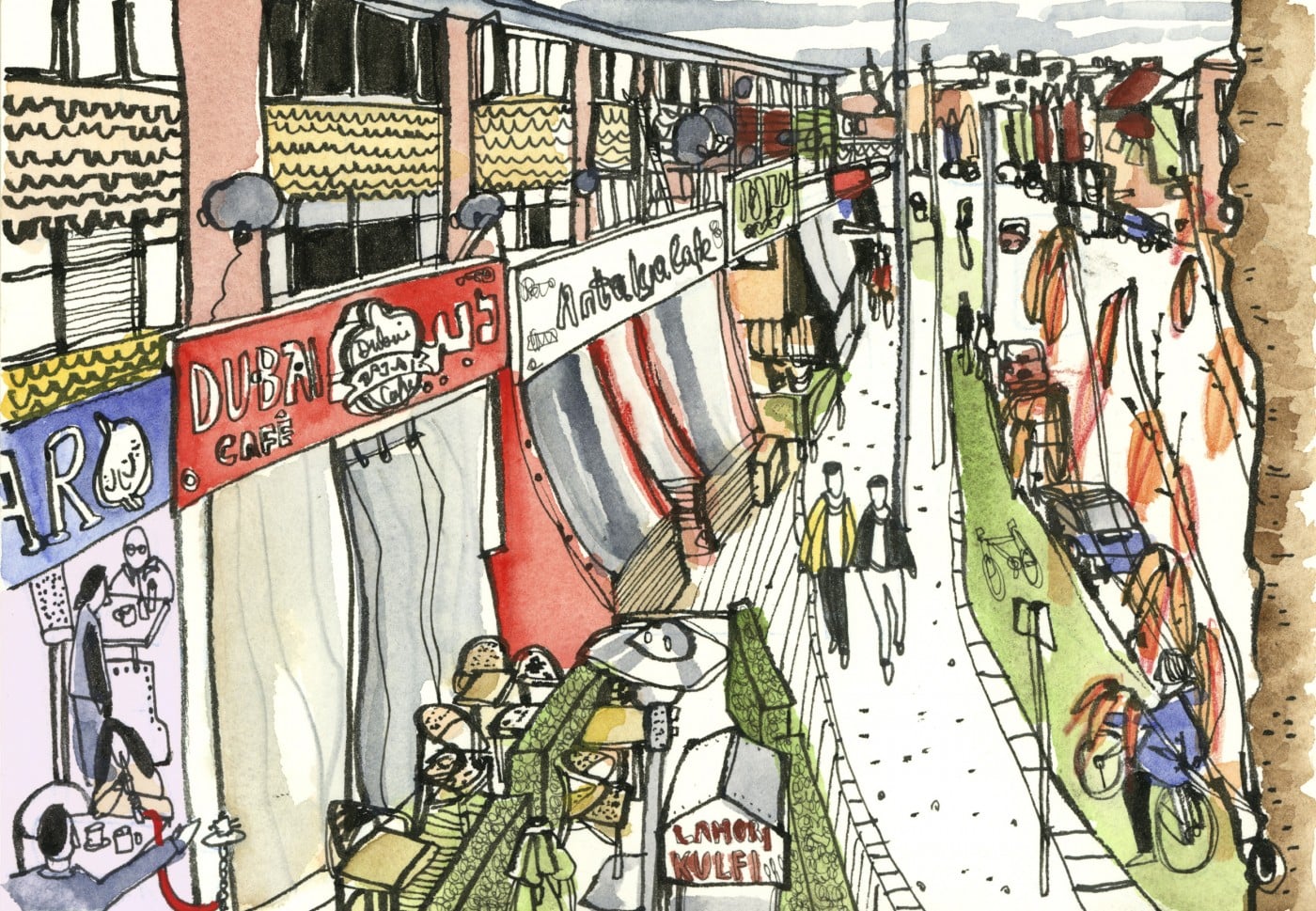
LG: I think inevitably you capture it. In terms of any of the places in Manchester, Rusholme changes most often, you know, the number of shops etc. But not just the turnover of shops, the type of people who are running the shops, and it does reflect how, I think, our city is welcoming to other nationalities. Migration is most often affected by conflict and so, in recent years, you see a lot of Middle Eastern influences.
Accompanying a recent sketch Len has included a Laurence Stephen Lowry quote: ‘A street is not a street without people… It is as dead as mutton.’ Both Lowry and his mentor Pierre Adolphe Valette were famous for capturing Manchester’s people and places, for capturing moments in time. I wanted to know if this was something that had influenced Len – whether his work was a possible extension of theirs.
Yes, is the answer. Len actually photographed the construction of the Lowry arts centre in Salford Quays and illustrated a book by one of the curators.
LG: I’ve read a lot of about Lowry. He walked the streets as a rent collector and I, in my work as a photographer and as a sketcher, will have walked the same places, and there’s something quite nice about that.
FS: And I suppose for you as photographer, or him as a rent collector, you have to talk to people, to have these dialogues.
LG: So he was out doing little pencil sketches whilst he was supposed to be collecting rent and people inevitably would have got into conversation with him, they would become aware of him, would know him. Similarly, when I’m in Rusholme now people are beginning…
FS: …to recognise you?
LG: Yeah, there’s a couple people who recognise me.
As a customer, he doesn’t go to Rusholme as often as he once did, having over the years moved his allegiance to eateries in south Manchester, which certainly corresponds with the rise of Chorlton and Didsbury becoming greater culinary destinations. The project has however put him in touch with new places, and he’s brought family to restaurants in turn.
He’s illustrated some of my Rusholme favourites, Mughli and Atlas Shawarma. I asked him what his go-to spots were.
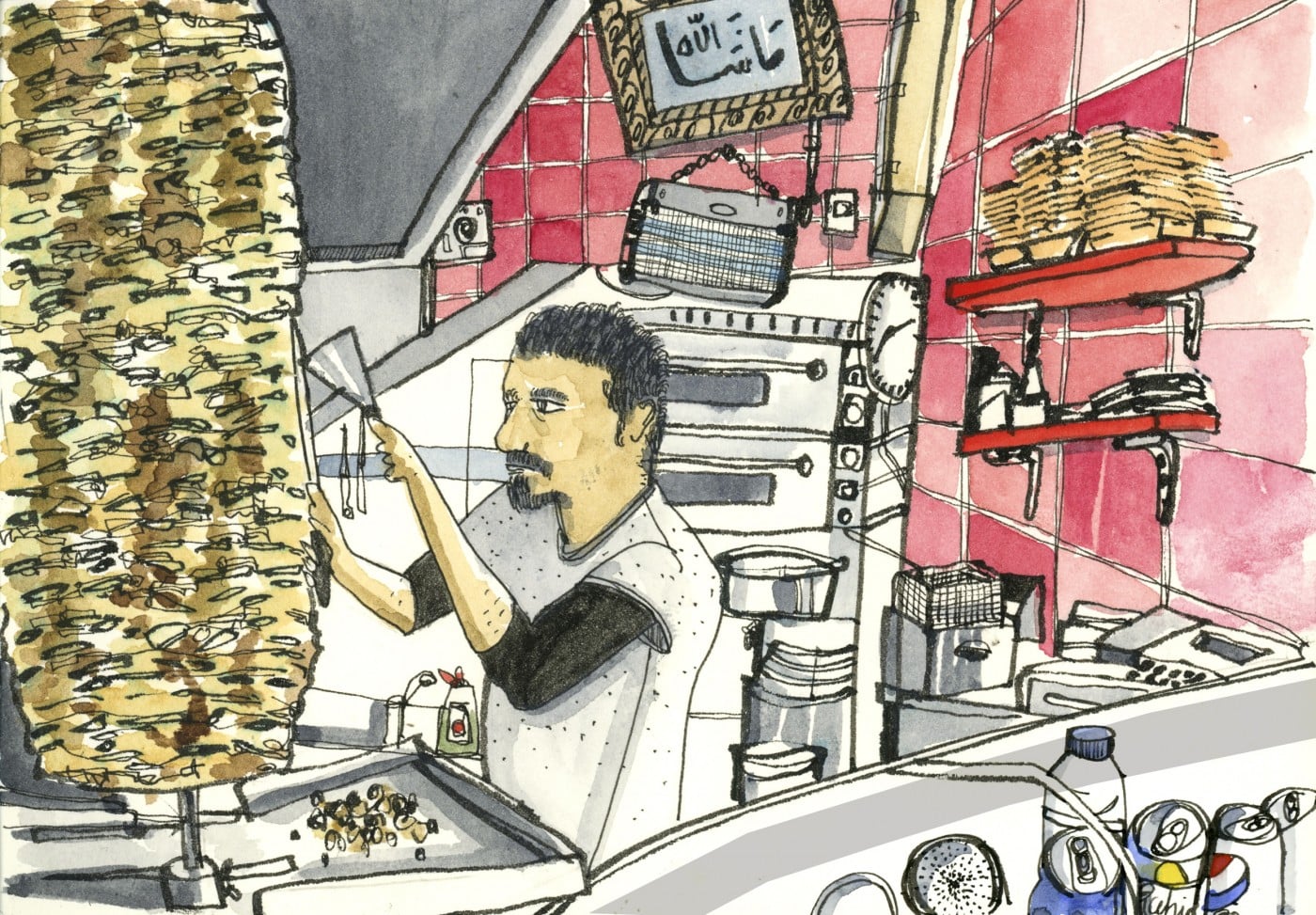
He said Mughli, or Jaffa, but the majority of his family are vegetarian, if not vegan, which can restrict his choices.
FS: It’s interesting how these places change in popularity, isn’t it? What, in culinary terms, is on trend. I’ve seen food crop up in a few a few things you’ve done – Sown In Bolton and the chocolate thing, and now this. The intersection of food and art – is that something you’ve tried to…?
LG: Not purposely, but, you know, it happens. Food is with us, isn’t it? It hasn’t purposely been; it’s something I’ve kind of fallen into.
FS: Really, that’s interesting.
LG: I’m still developing a style of how to draw food I think.
FS: I think food in art is fascinating because we see, classically, the ornate bowls of fruit, the braces of pheasant, but you don’t really see anyone eating, for example. Somewhere like Rusholme must make great subject matter, especially places like the sweet shop.
LG: Yeah the sweet shops, as you can imagine, are a bit overbearing with how much there is to draw. I discovered a bakery down a side alley that does all the baklava which I’ve got to sketch. I’d like to develop the project a little more with detailed sketches of the curries, the waffles, the milkshakes.
Lying open on the table in front of us is the sketch of a butcher.
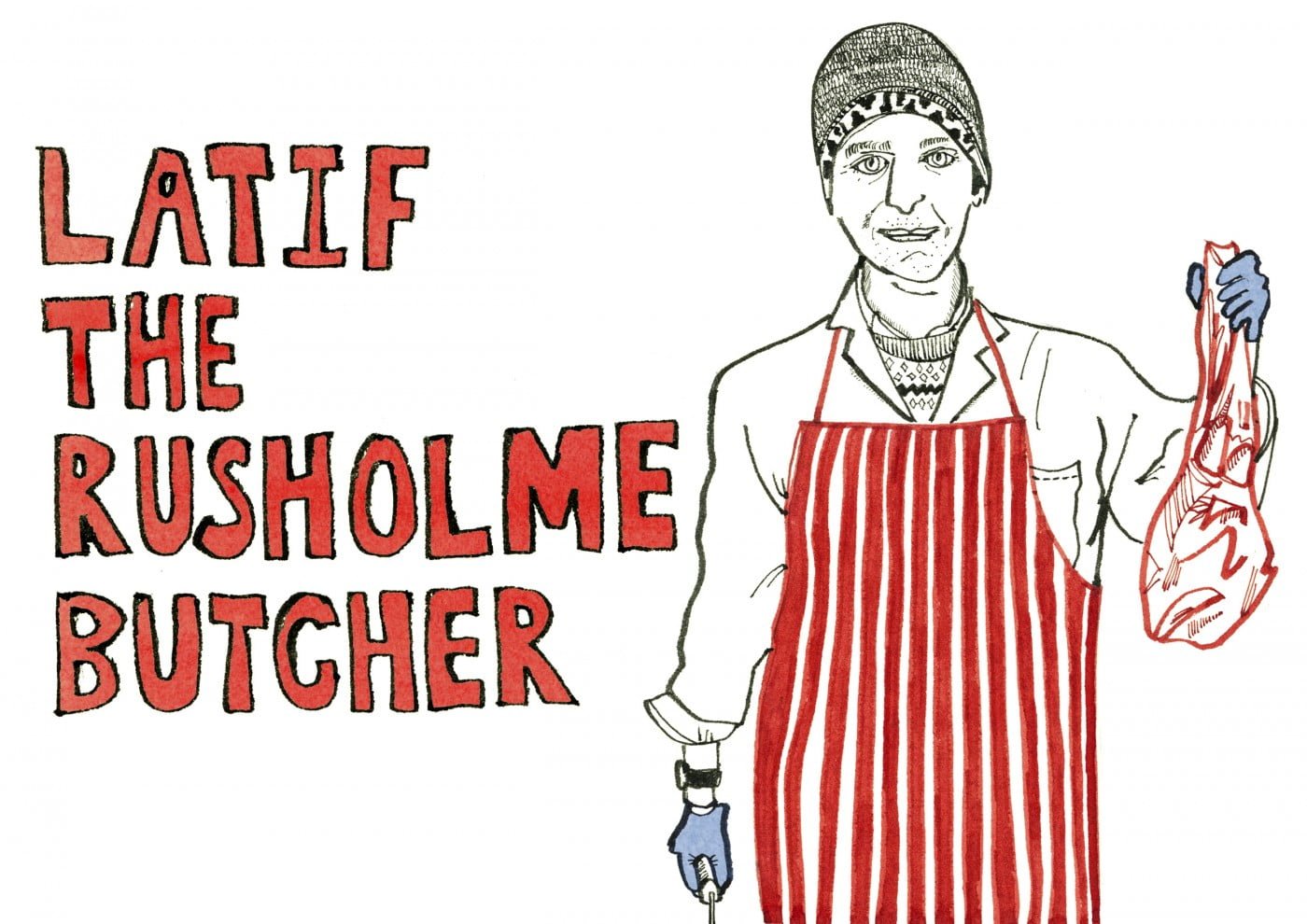
FS: So this guy (I say whilst gesturing at the book), I love the conversation with Latif. How you were trying to wheedle the nuances of Halal butchery out of him and all he wanted to know about was your colour palate.
LG: He was interested in me, and I was interested in him, and I’ve since been back to see him.
FS: Have you?
LG: Well, I’ve been back a couple of times, a few days after I met him I took him a water colour set. Then a few weeks after that I went in and he said, ‘Oh I wanted to show you what I’ve been doing, and I’ve been bringing it to the shop,’ but then, I haven’t been in, and then he stopped bringing it the shop, and then I went in! So I haven’t yet seen what he’s done.
FS: What do you think of The Curry Mile as a name? Its The Rusholme Sketcher, not The Curry Mile sketcher.
LG: It’s a name that sticks, doesn’t it?
We went on to imagine if at some point in the future all the curry restaurants were gone, and how amazing it would be to have to explain to people why and how it got its name. We agreed that it should always be called The Curry Mile, despite the ongoing developments, and despite it only being about a quarter of a mile long.
FS: Do you think travel is important as an artist?
LG: Yes, absolutely crucial, critical.
FS: Why?
LG: It’s very difficult to continually see your own city, your own space, with fresh eyes. Familiarity breeds invisibility. Travel is good because it means you go away and come back again. When you travel you obviously see new things and compare them with what you’re familiar with. It’s invigorating and refreshing; it refills your creative well.
FS: How did you get in to sketching and photography, was it art school?
LG: No, I didn’t go to art school, I did Business Studies at Trent Polytechnic. I didn’t become a photographer until I was 30, self taught, and because of that there’s always a bit of imposter syndrome going on.
FS: Really?
LG: Yeah, yeah absolutely.
Len did go on to admit that when he gets invited to give talks and workshops to photography or design students, that it does have reaffirming qualities, suggesting he must be doing something right.
After Trent Polytechnic in Nottingham he got jobs in sales and marketing, which he hated.
LG: The company car and the suit, business lunches, it just wasn’t me. A way of getting out of that was by turning my hobby into a profession, and photography was a hobby.
Just before he started photographing professionally he moved back to Manchester and has been living in Withington for the past 21 years.
Click here for the Rusholme Sketcher website
Filed under: Art & Photography
Tagged with: community, Curry Mile, local artists, manchester, The Rusholme Sketcher
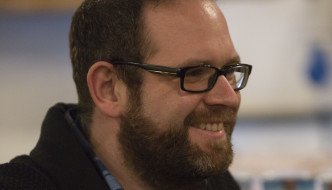
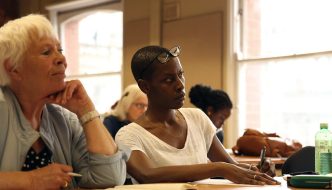
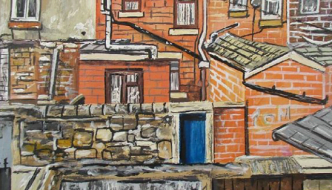
Comments